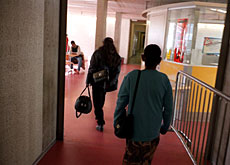Immigrants under no illusions about Blocher

People working with immigrants in Switzerland expect their situation to deteriorate following the election of Christoph Blocher to the government.
The hardliner from the rightwing Swiss People’s Party takes over as justice minister next month – a portfolio that includes asylum and migration issues.
Speaking ahead of International Migrants Day, Sandro Cattacin, director of the Swiss Forum for Migration Studies, told swissinfo that immigrants already faced a tough time.
“In Switzerland, the new wave of immigrants face problems regarding discrimination. They have difficulties finding jobs and finding housing,” he said.
Like others concerned with the status of immigrants, Cattacin is unsure how Blocher – a self-proclaimed isolationist – will shape the heated immigration debate in Switzerland.
Minorities’ representatives have already stated their intention to hold a national strike in protest at the outcome of the cabinet election.
“We are shocked that Blocher has been rewarded for his xenophobic propaganda with a seat in government,” said “Sans Nous”, a campaign group representing minorities, in a statement.
“Blocher will be in charge of an important ministry, and if he continues to follow his party’s line, then we fear the worst as migrants in this country,” Franco Bascani, one of the coodinators for the group, told swissinfo.
Citizenship debate
Next year the Swiss are set to vote on whether to grant automatic citizenship to third generation immigrants and ease naturalisation restrictions for the second-generation.
Together these two groups constitute about six per cent of the Swiss population.
The proposals are being opposed by the People’s Party and Cattacin believes Blocher will do all he can to stop them becoming law.
“I think this will certainly be blocked by Blocher and by his political party,” he said.
Blocher is also against Switzerland joining the European Union’s Schengen and Dublin accords on cross-border crime and asylum.
The People’s Party opposes Schengen because it believes it will undermine Switzerland’s sovereignty, as border controls would cease to exist.
The rightwing party won 26.6 per cent of the vote in October’s parliamentary elections and now has the most seats out of any party in the House of Representatives.
Fitting in
Cattacin says that while the older generation of immigrants who arrived from Italy, Spain and Portugal in the 1960s and 70s are widely accepted, this is not the case for new immigrants.
“They face not only discrimination but stereotypes about their integrity. In general people from Africa and Kosovo, for example, are considered criminals and this is simply not true,” he explained.
In the 1980s a new wave of Tamil immigrants began arriving in Switzerland. They were followed in the 1990s by immigrants from the Balkans along with asylum seekers from a number of African countries.
The People’s Party paints the more recent arrivals as a burden to the social welfare system and a threat to job seekers.
In October’s elections, the party used an aggressive advertising campaign blaming immigrants – specifically black Africans and Albanians – for Switzerland’s rising crime rate.
The United Nations refugee agency described the adverts as some of the most blatantly anti-asylum ever seen in Europe.
Wait and see
However, over at the Federal Refugee Office, spokesman Dominique Boillat says officials are looking forward to a constructive working relationship with Blocher.
“He must be conscious that there are a lot of points in the asylum law that cannot be changed in ways that his party has proposed,” he said
“Election propaganda in the media is one thing. But as a cabinet minister you have to apply the laws that have already been decided. The two can be very different.”
Many commentators agree that Blocher’s ability to make things happen will be hamstrung by Switzerland’s system of consensus government. Much will depend on the alliances he can forge within the cabinet.
For his part, Blocher has said he will not comment on his portfolio until he starts his new job on January 1.
With the number of migrants worldwide set to rise dramatically from the current figure of 175 million people, Cattacin hopes the new minister will confound his critics.
“We are not a stable population but a mobile population, and we have to find a solution to live together in this mobile society,” he said.
swissinfo, Karin Kamp
One in three people in Switzerland is an immigrant or a descendent of immigrants.
One in five inhabitants is a foreign national.
Switzerland has 26,500 recognised refugees.
There are 65,000 asylum seekers.
One in four marriages in Switzerland is bi-national.
21 per cent of permanent foreign residents are from Italy.
14 per cent are from the former Yugoslavia.
10 per cent are from Portugal and 5 per cent are from Turkey.

In compliance with the JTI standards
More: SWI swissinfo.ch certified by the Journalism Trust Initiative











You can find an overview of ongoing debates with our journalists here . Please join us!
If you want to start a conversation about a topic raised in this article or want to report factual errors, email us at english@swissinfo.ch.